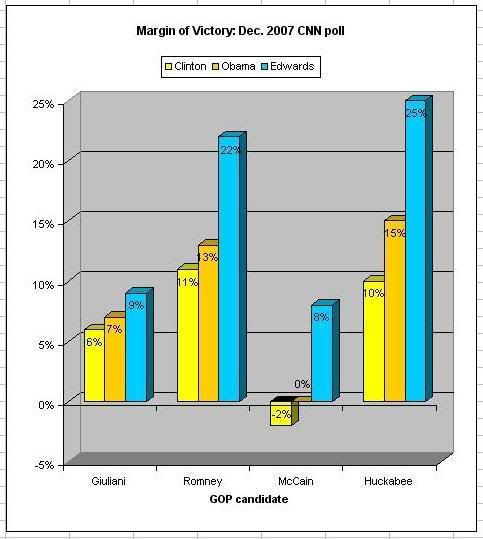THE ASSASSINATION of Benazir Bhutto presented U.S. presidential candidates with a test: Could they respond cogently and clearly to a sudden foreign policy crisis? Within hours some revealing results were in. One candidate, Democrat John Edwards, passed with flying colors. Another, Republican Mike Huckabee, flunked abysmally. Democrat Hillary Clinton and Republican John McCain were serious and substantive; Republicans Mitt Romney and Rudy Giuliani were thin. And Barack Obama -- the Democratic candidate who claims to represent a new, more elevated brand of politics -- committed an ugly foul.
Let's start with Mr. Edwards, who managed not only to get Pakistani President Pervez Musharraf on the phone Thursday but also to deliver a strong message. The candidate said he had encouraged Mr. Musharraf "to continue on the path to democratization [and] to allow international investigators to come in and determine what happened, what the facts were." Those are words the Pakistani president needs to hear from as many Americans as possible. He has yet to confirm that the Jan. 8 parliamentary elections will go forward and risks a destabilizing backlash against his own government unless he delivers a full and credible account of the authors and circumstances of Ms. Bhutto's killing.
Ms. Clinton and Mr. McCain also endorsed Pakistan's continued democratization. Each cited an acquaintance with Ms. Bhutto or Mr. Musharraf and opportunistically trumpeted their foreign policy experience -- but both also offered some cogent analysis. Ms. Clinton rightly cited "the failure of the Musharraf regime either to deal with terrorism or to build democracy," adding that "it's time that the United States sided with civil society in Pakistan."
At the other extreme was Mr. Huckabee, whose first statement seemed merely uninformed: He appeared not to know that Mr. Musharraf had ended "martial law" two weeks ago. That was better than the candidate's next effort, when he said an appropriate U.S. response would include "very clear monitoring of our borders . . . to make sure if there's any unusual activity of Pakistanis coming into our country." The cynicism of this attempt to connect Pakistan's crisis with anti-immigrant sentiment was compounded by its astonishing senselessness.
By comparison, the Giuliani and Romney statements were anodyne -- they deployed slogans about fighting terrorism or "jihadism" while avoiding serious comment about Pakistan. Mr. Obama similarly began by offering bland condolences to Pakistanis and noting that "I've been saying for some time that we've got a very big problem there."
Then Mr. Obama committed his foul -- a far-fetched attempt to connect the killing of Ms. Bhutto with Ms. Clinton's vote on the war in Iraq. After the candidate made the debatable assertion that the Iraq invasion strengthened al-Qaeda in Pakistan, his spokesman, David Axelrod, said Ms. Clinton "was a strong supporter of the war in Iraq, which we would submit was one of the reasons why we were diverted from Afghanistan, Pakistan and al-Qaeda, who may have been players in the event today."
When questioned later about his spokesman's remarks, Mr. Obama stiffly defended them -- while still failing to offer any substantive response to the ongoing crisis. Is this Mr. Obama's way of rejecting "the same Washington game" he lambasted earlier in the day? If so, his game doesn't look very new, or attractive.
It's interesting that on ABC's This Week, conservative George Will seemed desperate to dismiss what Edwards did by calling Musharraf, and then also tried to dismiss his populist campaign. The more it looks like he could actually win Iowa, the more Edwards is freaking out the Beltway pundits who've been wrong on just about everything.
One of the attacks I've seen directed at Edwards is that he's not sincere. Well, the parasites that make up the Beltway punditocracy in this country certainly seem to think he's the real deal, otherwise they wouldn't be shitting their pants over his candidacy.







